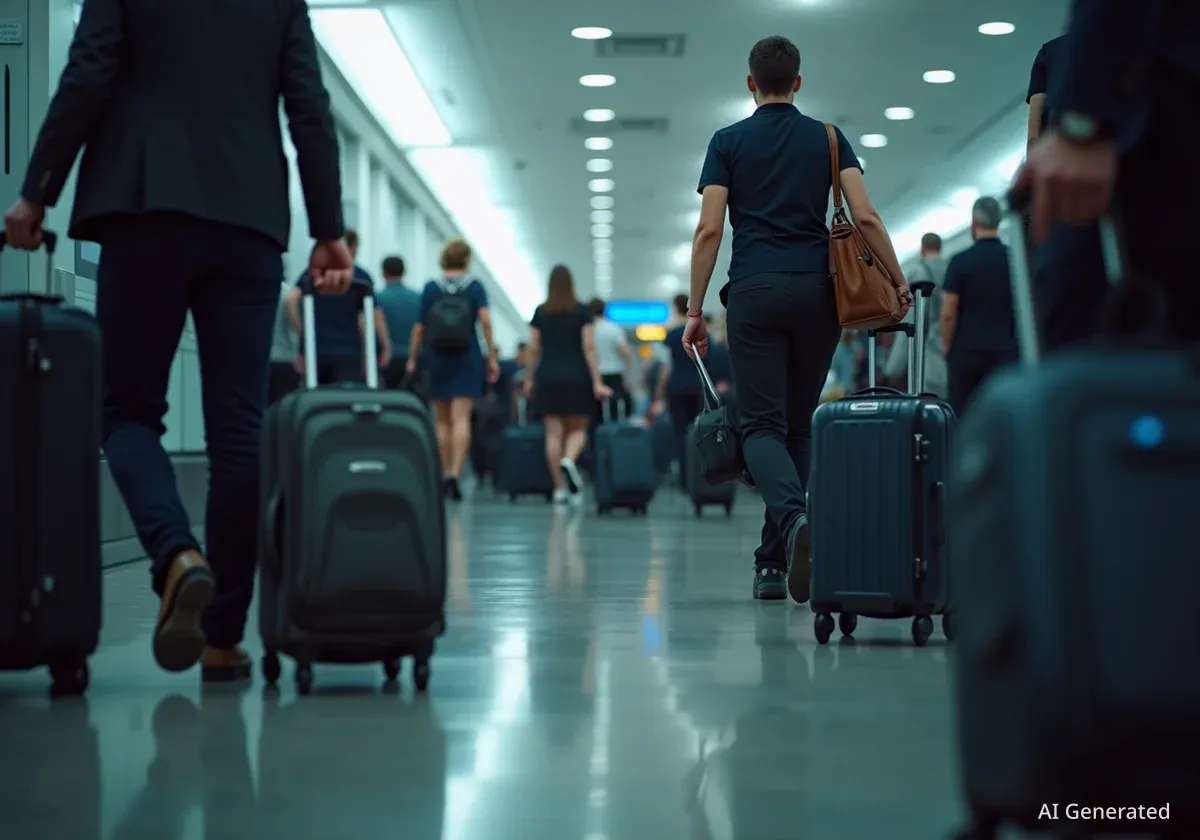A new $100,000 fee for H1B visas, announced by the Trump administration, led to immediate confusion and disruption for visa holders and companies. Reports from airports indicated passengers attempting to disembark flights to avoid leaving the U.S., fearing they would not be allowed to return under the new policy. This sudden change, effective September 21, 2025, has generated significant debate regarding its legality and potential impact on the U.S. economy and its skilled workforce.
Key Takeaways
- A new $100,000 fee for H1B visas caused immediate travel chaos.
- Some H1B visa holders reportedly left planes to avoid leaving the U.S.
- The policy's legality is under question, with no clear legal basis cited.
- Companies rushed to bring employees to the U.S. before the fee took effect.
- Experts suggest the policy could benefit other countries by deterring skilled workers.
Immediate Impact on Travelers and Companies
The announcement of the H1B visa fee created a wave of concern among current visa holders. Many who were traveling internationally found themselves in a difficult position. There were reports of passengers seeking to get off planes before departure, worried that if they left the U.S., they might not be granted re-entry under the new fee structure.
One notable incident involved an Emirates flight departing from San Francisco. The flight experienced a delay as several passengers insisted on disembarking. The captain of the flight reportedly made an announcement acknowledging the "unprecedented circumstances" and allowing passengers to exit the aircraft if they no longer wished to travel.
Companies that rely on H1B workers also reacted quickly. Many instructed their successful H1B candidates to enter the United States within 24 hours. This urgency aimed to ensure employees could arrive before the new fee became active, preventing additional costs or complications.
"Ladies and Gentlemen, this is the captain speaking. Due to the current circumstances obviously that are unprecedented for us at Emirates, we are aware that a number of passengers do not wish to travel with us, and that’s particularly fine," an Emirates captain reportedly announced.
Corporate Warnings and Countermeasures
Major technology companies like Microsoft issued warnings to their employees regarding the policy change. These advisories highlighted the potential implications for H1B visa holders.
Fast Fact
Online activists attempted to book up airline seats on departing flights to prevent individuals from leaving the U.S. and thus avoiding the new H1B visa fee deadline.
The goal of these activists was to keep H1B holders within the U.S. borders, making it harder for them to accidentally trigger the new fee upon re-entry. This action underscores the level of concern and the immediate, widespread reaction to the policy.
Questions of Legality and Implementation
The $100,000 H1B visa fee has faced immediate legal scrutiny. Critics argue that the fee lacks a legal basis. There is no existing law that supports such a charge, nor has there been any formal administrative rulemaking process as required for significant policy changes.
President Trump signed a proclamation announcing the fee, making it effective on September 21, 2025. However, fees for visas and immigration programs are typically set by Congress or by agencies acting under specific laws passed by Congress. Legal experts indicate that no current law grants the President or the Department of Homeland Security the authority to impose a fee of this magnitude.
Program Context
The H1B visa program is designed to allow U.S. employers to temporarily employ foreign workers in specialty occupations. These occupations generally require a bachelor's degree or higher in a specific field. The program has an annual cap, and demand for these visas often exceeds the available supply.
There is an explicitly established fee schedule for the H1B program, which has been legally set. The new $100,000 fee does not align with this schedule. Furthermore, federal law (8 U.S.C. § 1356(m)) permits executive branch agencies to set fees only to recover costs associated with a program. A $100,000 fee is widely seen as unrelated to the administrative costs of processing an H1B visa.
Challenges to Executive Authority
Legal scholars suggest that a policy shift of this scale concerning skilled immigration might be considered a 'major question.' The Supreme Court has previously indicated that such significant policy changes fall under the purview of Congress, not the executive branch. This principle was highlighted in cases like West Virginia v. EPA and Biden v. Nebraska.
If the fee is considered a rulemaking, it would need to follow the Administrative Procedures Act. This includes requirements for public notice and comment, and the rule must avoid being arbitrary and capricious. A sudden $100,000 fee would likely face challenges on these grounds. The administration might argue for broad presidential authority under 8 U.S.C. § 1182(f) to suspend or restrict the entry of certain aliens. However, this fee is a cost imposed on a visa program, not a suspension or restriction of entry itself, and it contradicts existing statutory fee structures.
Economic Implications and Skilled Labor
Despite the administration's stated goal of prioritizing American jobs, research suggests that H1B workers do not significantly displace U.S. workers. With unemployment at 4.3%, these workers fill specific skill gaps, particularly in high-tech industries.
Studies indicate that companies gaining access to global talent through the H1B program often see positive outcomes. For instance, a study of 2,000 tech startups found that one additional high-skilled worker increased the likelihood of a successful Initial Public Offering (IPO) within five years by 23%.
- Firms with higher H1B visa lottery win rates are more likely to receive additional external funding.
- These firms show a greater chance of having an IPO or being acquired.
- They are also more likely to secure funding from high-reputation venture capitalists.
- Higher win rates correlate with more patents and increased patent citations.
This data suggests that access to skilled foreign workers has a strong positive effect on firm-level success measures, contributing to innovation and economic growth.
A Strategic Gift to Other Nations?
The policy's initial announcement caused confusion about whether it would apply to existing H1B holders. The administration later clarified that the fee would not apply to those already holding H1B visas. However, the overall impact is expected to deter new skilled workers from choosing the United States.
Many experts view this policy as a "strategic gift" to countries like Canada, the United Kingdom, and European nations. These countries may become more attractive destinations for highly skilled international professionals who might otherwise have chosen the U.S. This shift could lead to a brain drain from the U.S., potentially hindering its innovation and competitiveness.
The U.S. has historically benefited from attracting top global talent. Policies that make it harder for skilled individuals to enter or remain in the country could have long-term negative consequences for its economic and technological leadership.





